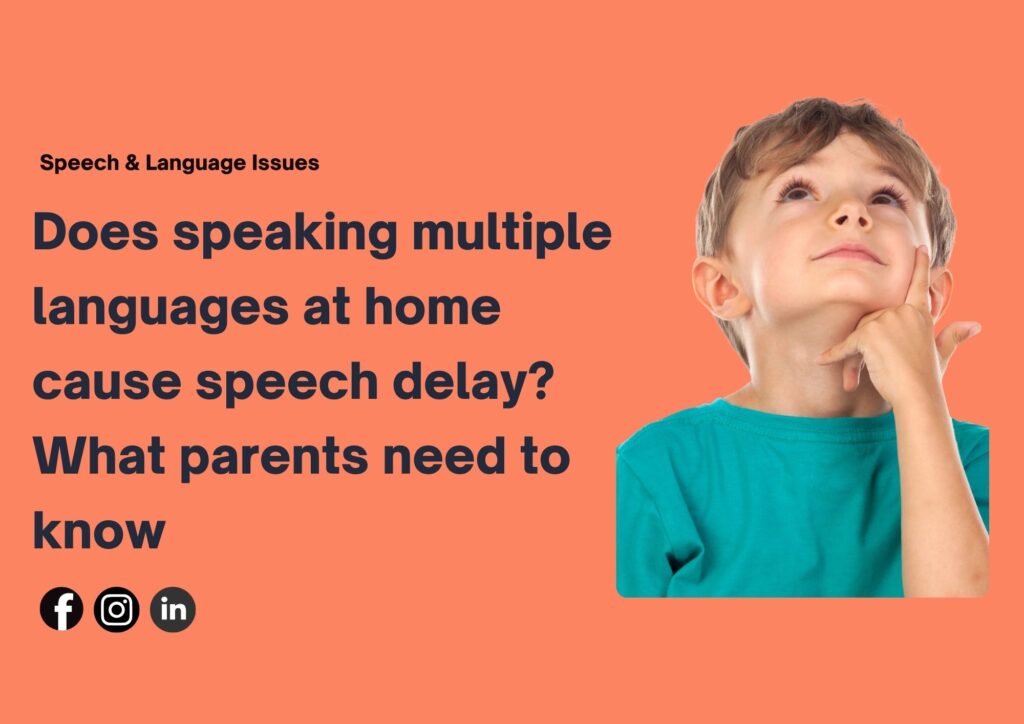
“Should we stick to just one language so our child starts talking sooner?”
Let’s talk about what’s really going on when a multilingual child seems like a “late talker,” and how you can support your child’s communication without giving up the beauty of your family’s languages.
Does Speaking Multiple Languages Cause Speech Delay?
The short answer? No.
Lots of people believe that learning more than one language confuses children and causes speech delays. But the truth is:
Speaking multiple languages does NOT cause a delay in speech or language development.
Children around the world grow up learning two, three, or even more languages—and they go on to speak clearly, confidently, and on time.
Their brains are actually built to absorb language, especially in the early years.
So Why Does My Child Seem Behind?
Here’s what might be happening if your multilingual child seems delayed:
-
- They might have fewer words in each language.
For example, your child may say “mama” in English and “paani” in Hindi, so the vocabulary is split.
- They might have fewer words in each language.
-
- They may mix languages in the same sentence.
This is called “code-switching” and it’s completely normal. Even adults do it!
- They may mix languages in the same sentence.
-
- They may take slightly longer to start talking.
Some bilingual or multilingual kids start using words a little later—but this is still within the typical range of development.
- They may take slightly longer to start talking.
Important:
If your child is truly delayed, the delay will show up in all languages—not just one.
But What If My Child Already Has a Speech Delay?
If your child has a diagnosed speech or language delay, speaking multiple languages isn’t harmful—but it can make things a bit trickier.
Here’s why:
-
- It might feel like progress is slower.
-
- It can be harder to track improvements.
-
- Your child might not get enough repetition in each language to build strong vocabulary.
This doesn’t mean you have to stop using your languages. It just means we may need to simplify things for now.
Most Speech-Language Pathologists (SLPs) will suggest choosing one main language—usually the one your child hears most at home or school—for speech therapy and structured activities.
Once your child gains confidence, you can naturally support the other languages again.
What Can You Do as a Multilingual Family?
You don’t need to stop speaking your language at home. But here are some simple ways to support your child:
-
- Choose one main language for teaching new words, reading books, and therapy.
-
- Keep using your other languages during play, songs, or family chats—just casually.
-
- Repeat things often in your chosen language to help your child learn.
-
- Celebrate all forms of communication— words, sounds, pointing, gestures.
-
- Don’t wait and see.
If your child isn’t meeting key milestones, it’s okay to ask for help early.
- Don’t wait and see.
Here’s when to reach out:
-
- Your child has fewer than 50 words by age 2
-
- Not combining words by 2.5 to 3 years
-
- Gets easily frustrated trying to express themselves
-
- Struggles to follow simple directions
Book a free consultation with our speech and language team—we’ll create a home language plan that works for your child and your family.
Final Thoughts
Multilingual homes are beautiful, and they don’t cause speech delays. If your child is delayed, focusing on one language can help—but that doesn’t mean giving up your cultural roots.
With the right support, your child can learn to communicate clearly and confidently—in all their languages.
More Help for Parents
-
- Visit Neuronurture Kids to learn how our therapies support early speech and communication
-
- Book a free consultation with our team today